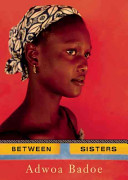
Between Sisters
Written by Adowa Badoe
Groundwood Books, 2010, 208 pp.
ISBN: 978-0888999979
This story is about a 16-year-old girl, Gloria Bampo, who lives in Accra, rural Ghana. The narrative focuses on her struggle to find her identity as she moves from rural to urban settings. She has just failed most of her high-school exams, which leaves her feeling ashamed that she can barely read or write English. The exam failure drastically limits her options for a future as a ‘somebody’ in Ghana. Then amazingly Gloria is offered the chance to move to the city, Kumasi, to work for a rich female doctor, Christine, as a ‘sister’ not as a housekeeper and nanny. One of her aunts arranges this as Christine is a distant relative. Her aunt also assures Gloria that she is supposed to move in as a ‘sister’ rather than a servant and that after two years Christine will send her to dressmaking school as a form of repayment. Gloria’s family situation has her father unemployed and her mother seriously ill. Her sister, Effie, seems to have a secret life complete with a sailor boyfriend, even though not much is mentioned in the story. The family jumps at the chance, as food is scarce in rural Ghana, specifically in their underprivileged home.
Gloria moves to Kumasi, cares for her young charge, Sam, and goes through her chores with a positive mindset. In the process she is introduced to the nicer things in life as well as the chance for one-on-one academic mentoring from Christine. Circumstances lead her to get new clothes, new friends, and the attentions of a doctor, Kusi, creating their own forms of enticements. The situation gets complicated quickly with Gloria falling in love and having an affair with Kusi (who seems to have done this many times before with young girls) and her new girlfriend stealing from Christine and blaming it on Gloria. When Christine finds out about the lost money, she blames Gloria despite Gloria’s impassioned denials. She later finds out about Gloria’s innocence but never apologizes. Her own people, thus, betray Gloria. Her greatest shock is when she finds out that the ‘sister’ she left her family for, was really never a sister at all.
Christine’s character also seems to have gone through a transformation. Her husband lives in England while she works in Ghana. As she has assimilated into her higher education and well-to-do lifestyle, she has embraced a new way of thinking and being even though she insists on staying on in Ghana while her doctor husband is pushing to move to England. She seems to have become a ‘colonizer’ in her own right, e.g. her poor distant cousin. She takes advantage of Gloria’s situation, never pays her a penny, is quick to lay blame, and threatens to kick her out without much thought. The irony is that Gloria, in turn, realizes that while Christine is not a ‘sister’ to her, it is still to her advantage to stay even after so much has happened. Gloria has nothing to go back home for and she has also changed too much to return to her previous way of life. The issue in this story is the movement of ‘nobodies’ to ‘somebodies’ in present day Ghana. Education seems to be the avenue for this movement. The protagonist loses her virginity as well as her sense of self in the struggle to become ‘somebody’ in urban Ghana, only to realize that she does not belong in her urban or rural surroundings. She goes back home to visit only to find that she is a misfit there as well. Her identity, thus, becomes a confused ‘hybrid’ in her own country, as does Christine’s.
The story delivers an interesting glimpse into a culture, but, unfortunately, does not build from there. The characters seem stagnant and the introduction of apprehension about the AIDS epidemic of the early 1990s seems forced. The pace of the novel is quick with complications being introduced and solved within a few pages. The conclusion of the story does not offer much resolution, as the biggest conflicts are not dealt with, such as those of Gloria’s future, her poverty, or her mother’s nameless illness. Many characters are introduced in the story and they threaten to overwhelm the reader. The universality of betrayals, arguments, secrets and misunderstandings, as well as the building of relationships and romance, however, connects this story to self and world.
The author is a physician from Ghana now living in Canada. She provides her own interpretation of contemporary middle-class Ghana, including those who dream of leaving for Western countries, as she has done in real life. She has published over 14 children’s books, mostly picture books, and her authorship includes markets for Africa. She is heavily involved with storytelling and dance to share the lives of the people of different African regions.
Between Sisters can be paired with other books that focus on identity formation and the struggle to find self. The same thematic threads can be found in books about African regions such as: City Boy (Jan Michael, 2009), Where I Belong (Gillian Cross, 2011), and My Name is Sangoel (Karen Lynn Williams, 2009).
Seemi Aziz, Oklahoma State University, Stillwater, OK
WOW Review, Volume V, Issue 2 by Worlds of Words is licensed under a Creative Commons Attribution-NonCommercial-ShareAlike 4.0 International License. Based on work at https://wowlit.org/on-line-publications/review/v-2/

Congratulations to author Anne de Graaf and Eerdmans Books for Young Readers for today’s 2013 Batchelder Honor Book Award for Son of a Gun. The Batchelder is awarded by ALSC for the most outstanding books originally published in a foreign language in a foreign country, and subsequently translated into English and published in the United States. Read more at: http://www.ala.org/alsc/awardsgrants/bookmedia/batchelderaward